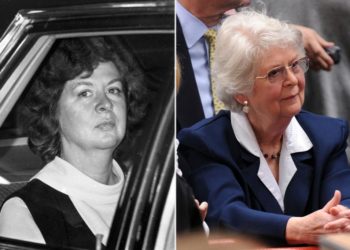Everyone is awful and ready to use cancel culture to their advantage—while simultaneously striving to avoid being cancelled themselves—in After the Hunt, Luca Guadagino’s drama about three Yale academics whose lives are thrown into turmoil because of a serious allegation made by one about the other.
A far cry from just about every one of the director’s prior efforts (including last year’s Challengers and Queer), the film—which is the opening night selection of the New York Film Festival, and in theaters Oct. 10—affords Julia Roberts her best part in years as a professor whose role in a burgeoning scandal threatens to expose her deep, dark (related) secrets. She’s not enough, however, to make this wannabe-conversation starter coherent, much less insightful.
Guadagnino appropriates Woody Allen’s trademark title-card fonts for After the Hunt, and unless he’s doing so because the legendary American auteur became persona non grata due to allegations about sexual misconduct—which, admittedly, would be out-of-left-field strange—the gesture makes no sense.
Fortunately, Roberts immediately shifts attention away from such questions. Her Alma Imhoff is a philosophy professor who’s married to psychiatrist Frederik (Michael Stuhlbarg) and is extremely close to both colleague Hank (Andrew Garfield), with whom she’s in competition for a coveted tenure spot, and doting PhD student Maggie (Ayo Edebiri), whose dissertation is on “the resurgence of virtue ethics.”
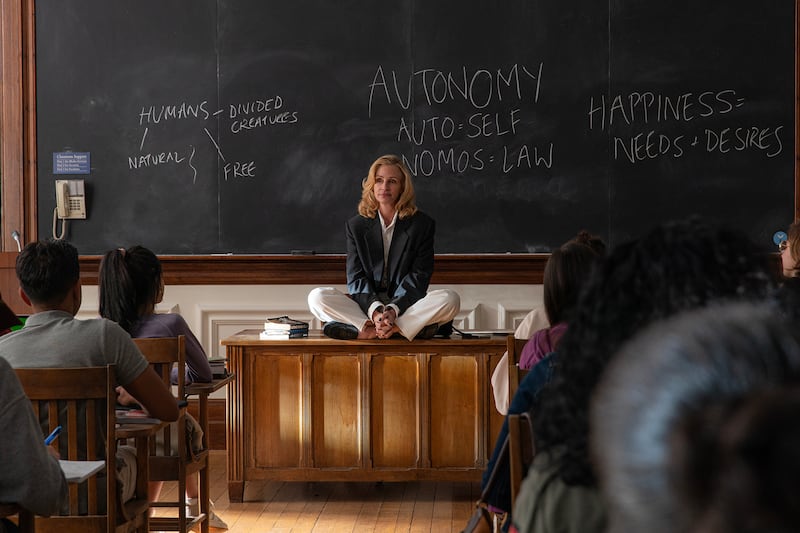
At a party at her home, Alma, her blonde hair as perfectly manicured as her disposition, carries herself with imperious coldness, and it’s amusing that in a later conversation, Frederik dispels the notion that she’s chilly, instead opting to describe her as “aloof.”
Frederik isn’t blind to Alma and Hank’s intimacy, commenting on it with a smile that’s pitched somewhere between sadly and angrily resigned, and at a subsequent meeting at a bar, Hank’s goodbye kiss makes clear that their relationship borders on the inappropriate. After the Hunt charges its initial action with these hints, as well as Maggie’s discovery of a carefully hidden envelope in Alma’s bathroom that contains photographs of a mystery man and a newspaper clipping.
To the recurring sound of a ticking clock, as well as a jarring Trent Reznor and Atticus Ross score (of piano, strings, woodwinds, and percussion) that often punctuates (and comments upon) the characters’ dialogue, Guadagnino sets his scene, whose momentum picks up the day after Alma’s shindig, when Maggie appears on her doorstep, soaking wet and rattled, with a bombshell announcement.
According to Maggie, upon departing Alma’s place, she walked home with Hank, who came up for a nightcap and proceeded to assault her. Alma’s first reaction is less than warm, and that proves to be the catalyst for her subsequent ordeal, in which she’s torn between Maggie, whom she wants to support (sincerely, and also because of #MeToo optics), and Hank, who meets with her to proclaim his innocence.
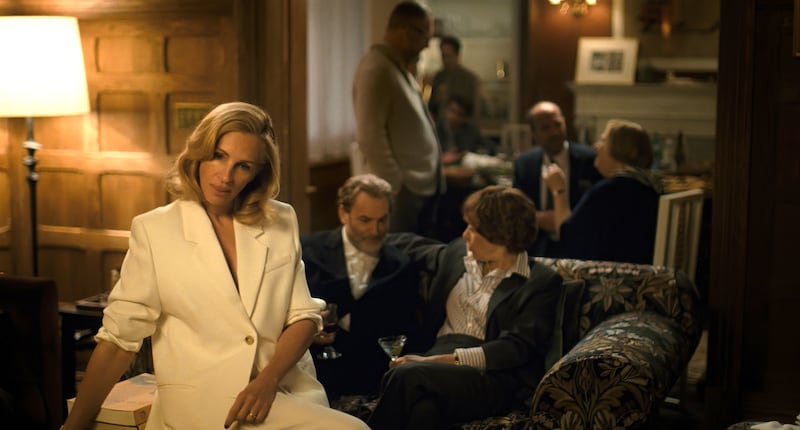
In fact, Hank says that Maggie is ruining his reputation because, in her apartment (which he admits was a foolish place to be), he confronted her about plagiarizing her dissertation. Alma doesn’t say she won’t support Hank. However, she knows which way the wind is blowing, both in terms of the culture at large (which is currently championing “believe women”) and her own professional fortunes, since with Hank out of the way, she’ll be a shoo-in for tenure.
After the Hunt’s scenario provides multiple personal and socio-political motivations for Alma, Hank, Maggie, and Frederik to say what they say and do what they do, the idea being that it’s easy to weaponize current trends and movements for one’s own purposes.
That’s true in a broad sense, but Nora Garrett’s script is more adept at introducing thorny issues than doing something illuminating with them. For the most part, it simply provides additional complicating revelations that compromise these men and women’s integrity, be it Maggie’s status as a privileged mediocrity who’s at Yale because of her wealthy parents’ donations, or Hank’s reputation as a reckless cad who’s known to flirt with his students.
That’s truest when it comes to Alma, who’s not only concealing her private envelope for shady reasons (which, naturally, speak to the themes raised by Maggie’s dilemma), but who’s so plagued with violent abdominal pains (which result in vomiting) that she pops pills and hits the bottle for relief.
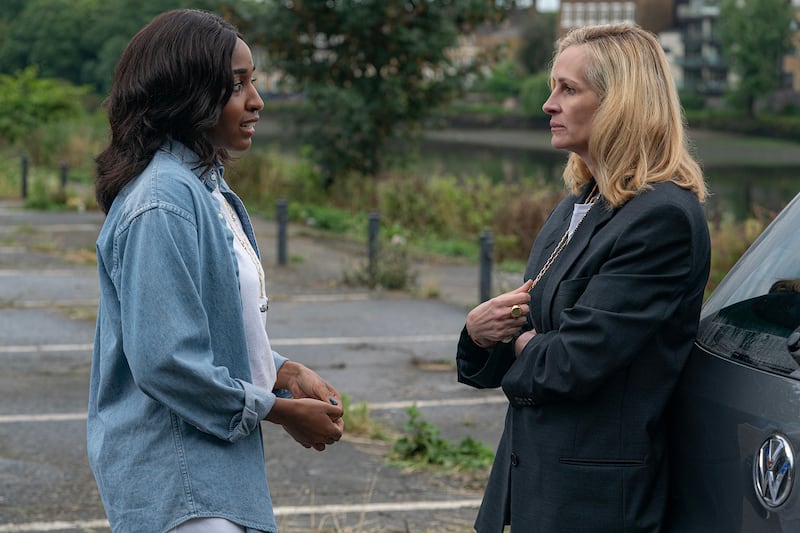
Roberts’ haughtiness is the most magnetic aspect of After the Hunt, and Guadagnino gradually chips away at it, having her physical condition deteriorate in time with the collapse of her life. The film is told through confrontational close-ups of faces and expressive shots of hands, and that approach works in Roberts’ favor, allowing her to intensely convey Alma’s varying shades of earnestness and caginess, altruism and selfishness, the latter of which accelerates as she finds herself in Maggie’s crosshairs.
There’s an inkling of Tár in After the Hunt’s portrait of Alma, who cares only about herself, berates a student for taking a progressive perspective on “the other,” and rolls her eyes at Maggie’s partner Alex’s (Lio Mehiel) they/them pronouns—not to mention suggests that Maggie is dating Alex merely for the performative social cachet.
Yet the film simultaneously paints Maggie and Hank as equally self-interested and manipulative, resulting in a muddled POV. It’s not that Guadagnino’s characters are unlikable (though they are). Rather, it’s that they’re all so morally compromised that the sole lucid thing to glean from their plight is that, in a world where grievances and wrongdoing can be countered (and erased) through imputations of sexism, racism, and the like, it pays to game the system when one’s back is against the wall.
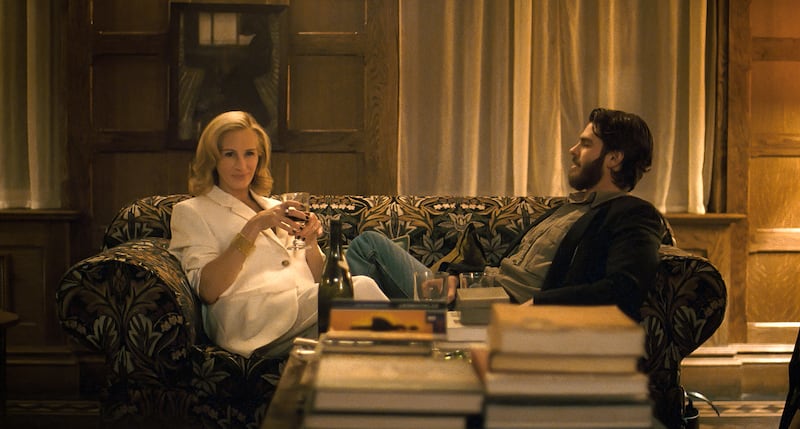
After the Hunt’s worldview is cynical, and its execution is uneven and enervating. For all the sharp cutting and tidy framing, Guadagnino can’t figure out how to infuse the material with urgency.
Consequently, even as Alma’s situation spirals out of control, driving her to take irresponsible measures to cope with her stress and agony, the film slowly peters out.
It’s wonderful to see Roberts getting an opportunity to shine, but in the future, one hopes it’s in service of something more than just a pretty, paltry provocation.
The post Julia Roberts Gives Her Best Performance in Years in ‘After the Hunt’ appeared first on The Daily Beast.




